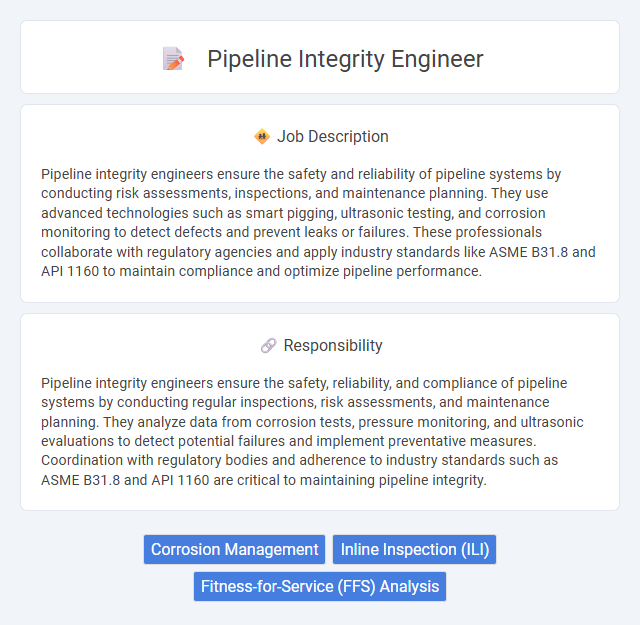
Pipeline integrity engineers ensure the safety and reliability of pipeline systems by conducting risk assessments, inspections, and maintenance planning. They use advanced technologies such as smart pigging, ultrasonic testing, and corrosion monitoring to detect defects and prevent leaks or failures. These professionals collaborate with regulatory agencies and apply industry standards like ASME B31.8 and API 1160 to maintain compliance and optimize pipeline performance.
Individuals with strong problem-solving skills and a keen attention to detail are likely suitable for a Pipeline Integrity Engineer role. Those who thrive in analytical environments and possess a background in engineering or a related technical field may find this job aligns well with their capabilities. Candidates who are comfortable with field inspections and data evaluation could have a higher probability of success in maintaining pipeline safety and compliance.
Qualification
A Pipeline Integrity Engineer typically requires a bachelor's degree in civil, mechanical, or petroleum engineering, often combined with certifications such as API 570 or NACE CIP Level 2. Proven expertise in pipeline inspection techniques, corrosion control, and risk assessment is essential for ensuring system reliability and safety. Strong knowledge of industry standards like ASME B31.8 and the ability to analyze structural integrity data are critical qualifications for this role.
Responsibility
Pipeline integrity engineers ensure the safety, reliability, and compliance of pipeline systems by conducting regular inspections, risk assessments, and maintenance planning. They analyze data from corrosion tests, pressure monitoring, and ultrasonic evaluations to detect potential failures and implement preventative measures. Coordination with regulatory bodies and adherence to industry standards such as ASME B31.8 and API 1160 are critical to maintaining pipeline integrity.
Benefit
A Pipeline Integrity Engineer likely enhances safety by preventing leaks and failures, which reduces environmental risks and costly shutdowns. This role probably offers strong career growth potential due to the critical nature of maintaining pipeline systems within the energy sector. Employees in this position might enjoy competitive salaries and opportunities for continuous learning in cutting-edge inspection technologies.
Challenge
Pipeline integrity engineer roles likely involve significant challenges related to ensuring the safety and reliability of pipeline systems under variable environmental and operational conditions. There may be complex risk assessments to predict potential failure points and implement preventive maintenance strategies. Adapting to evolving industry regulations and technological advancements probably requires continuous learning and innovative problem-solving skills.
Career Advancement
Pipeline integrity engineers play a crucial role in ensuring the safety and reliability of pipeline systems by conducting inspections, analyzing data, and implementing maintenance strategies. Career advancement opportunities in this field include progressing to senior engineering roles, project management, and specializing in corrosion control or risk assessment, often requiring additional certifications such as API 1169 or NACE. Professionals can also transition into leadership positions within asset integrity management or regulatory compliance departments to drive strategic initiatives and operational excellence.
Key Terms
Corrosion Management
Pipeline integrity engineers specializing in corrosion management employ advanced techniques such as ultrasonic testing, corrosion rate analysis, and cathodic protection systems to monitor and prevent pipeline deterioration. They analyze material properties, environmental factors, and fluid composition to develop predictive maintenance schedules that reduce pipeline failure risks and extend operational lifespan. Expertise in corrosion inhibitors, protective coatings, and API 579 fitness-for-service assessments ensures compliance with industry standards and regulatory requirements.
Inline Inspection (ILI)
Pipeline integrity engineers specializing in Inline Inspection (ILI) utilize advanced non-destructive testing technologies to assess pipeline conditions, detecting corrosion, cracks, and deformation. They analyze ILI data to ensure pipeline safety and compliance with industry standards such as ASME B31.8 and API 1163. Expertise in interpreting magnetic flux leakage (MFL) and ultrasonic inspection results enables proactive maintenance and risk mitigation for pipeline infrastructure.
Fitness-for-Service (FFS) Analysis
Pipeline integrity engineers specializing in Fitness-for-Service (FFS) analysis evaluate pipeline components to ensure safe operation under existing conditions, identifying flaws and assessing damage mechanisms using advanced tools like finite element analysis and fracture mechanics. They develop maintenance and repair recommendations based on API 579-1/ASME FFS standards to prevent failures and extend pipeline lifespan. Proficiency in corrosion assessment, material properties, and regulatory compliance is crucial for accurate risk mitigation and safeguarding pipeline infrastructure.
 kuljobs.com
kuljobs.com